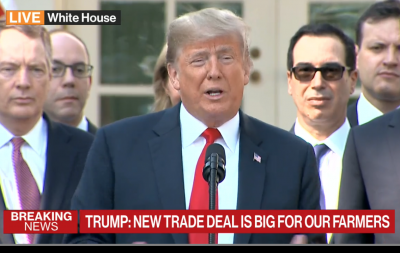As a result of the attack on Iran, nitrogen fertilizer at the port of New Orleans has seen an increase in price this week. Urea prices for barges in New…
Trump Promises 25% Tariff on Canada and Mexico
Reuters reported Monday evening that “U.S. President-elect Donald Trump said on Monday that on his first day in office he would impose a 25% tariff on all products from Mexico and Canada, and an additional 10% tariff on goods from China, citing concerns over illegal immigration and the trade of illicit drugs.”
“‘On January 20th, as one of my many first Executive Orders, I will sign all necessary documents to charge Mexico and Canada a 25% Tariff on ALL products coming into the United States, and its ridiculous Open Borders,’ Trump said in a post on Truth Social,” according to Reuters. “Trump said the tariffs would remain in place until the two countries clamp down on drugs, particularly fentanyl, and migrants crossing the border illegally.”

“On China, the president-elect accused Beijing of not taking strong enough action to stop the flow of illicit drugs crossing the border into the U.S. from Mexico,” Reuters reported. “‘Until such time as they stop, we will be charging China an additional 10% Tariff, above any additional Tariffs, on all of their many products coming into the United States of America,’ Trump said. Trump has previously pledged to end China’s most-favored-nation trading status and slap tariffs on Chinese imports in excess of 60% – much higher than those imposed during his first term.”
Agri-Pulse’s Oliver Ward reported that “the three countries are the largest export markets for U.S. agriculture.” In 2023, according to the USDA’s Economic Research Service, agriculture “exports to China were the largest share at $33.7 billion, followed by Mexico at $28.2 billion and Canada at $27.9 billion.”
RIP to all the wishful thinking from GOP lawmakers that Trump won’t slap broad tariffs on America’s largest trading partners, especially for farm products
Canada, Mexico, China —
Notable Trump is threatening these for now, w/ the hope that he’ll trigger deliverables by Jan 20 pic.twitter.com/1GGG52nkSE
— Meredith Lee Hill (@meredithllee) November 25, 2024
Bloomberg’s Nancy Cook reported that Trump “has long said he favors tariffs as a negotiating tool, even with US partners, and during the presidential campaign in 2024, he mused about replacing the federal income tax with revenue from trade levies. Most mainstream economists though have warned that Trump’s levies would raise prices for consumers, fueling already high inflation and redirecting or reducing trade flows.”
“Higher North American tariffs would upend the auto industry and other consumer sectors, including food, in which the three countries are highly integrated,” Cook reported. “A 25% tariff applied to all imports from Canada would put pressure on energy costs. Oil, gas and other energy products are Canada’s largest export to its southern neighbor; it’s by far the largest external supplier of crude to the US.”
“‘Tariff talk raises global inflation fears, creates concerns around global growth and increases geopolitical uncertainty,’ said Andrew Ticehurst, a senior rates strategist at Nomura Holdings Inc. in Sydney,” Cook reported. “‘The knee-jerk reaction in markets is a stronger dollar, higher yields and weaker equities.'”
Tariffs Could Be Negotiating Tactic for New USMCA
Reuters Costas Pitas reported Tuesday morning that “Trump’s threatened new tariffs would appear to violate the terms of the U.S.-Mexico-Canada Agreement (USMCA) on trade. The deal which Trump signed into law took effect in 2020 and continued the largely duty-free trade between the three countries.”
“Canada and the United States at one point imposed sanctions on each others’ products during the rancorous talks that eventually led to USMCA. Trump will have the opportunity to renegotiate the agreement in 2026, when a ‘sunset’ provision will force either a withdrawal or talks on changes to the pact,” Pitas reported. “…Trump could be counting on the threat of tariffs to prompt an early renegotiation of USMCA, said William Reinsch, a former president of the National Foreign Trade Council.”





